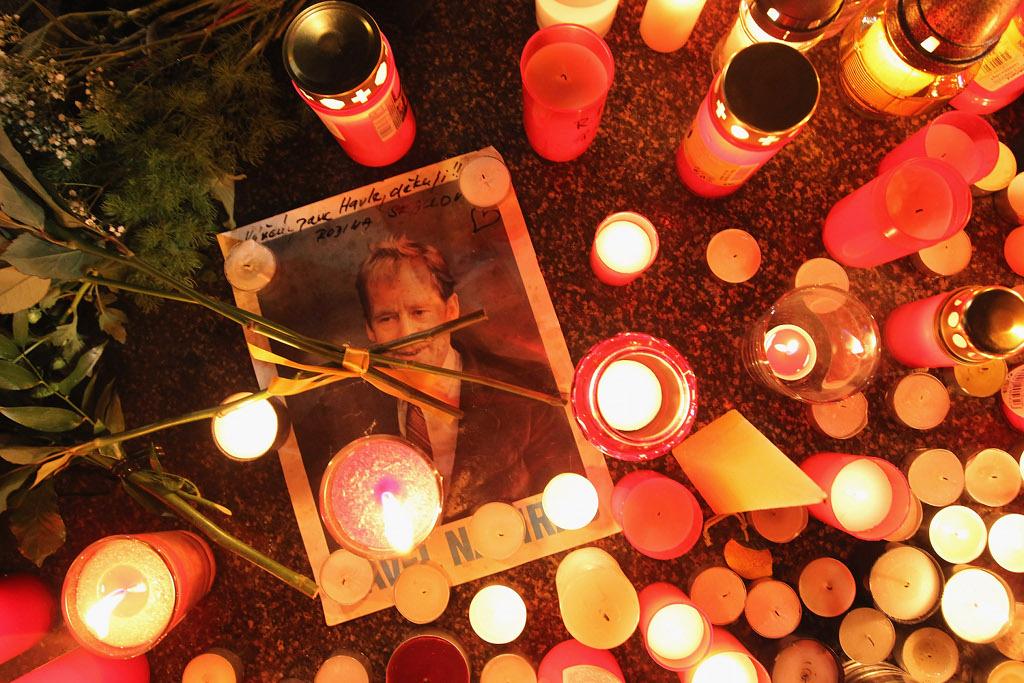A view from the right on the trouble’s of the European left
A spontaneous memorial to the late Czech president Vaclav Havel in Prague. Was he a man of the left? Hard to think of him as a man of the right. Or was he an avatar of a new kind of politics for which a convenient label has not been created?
Ambrose Evans-Pritchard, economics columnist at Britain's Daily Telegraph (aka Daily Torygraph) is in some ways a fairly dogmatic, right-wing British conservative: deeply euro-sceptic, inclined to see socialism lurking behind the mildest forms of social legislation, and longing for the days when Margaret Thatcher provided firm leadership.
But throughout this economic crisis he has provided some very interesting outside the box thinking. Today's column is worth a look. In it he details the troubles of the institutional left across Europe as political parties of the right – and in the case of Italy and Greece, unelected technocrats of a right-wing bent (or bent to the will of right-wing bankers in Germany and their minions in Brussels) – now control all but three of the EU's nations.
Pritchard writes, "Just as former Prime Minister Margaret Thatcher protested .. that 'we have not successfully rolled back the frontiers of the state in Britain, only to see them reimposed at a European level', the Left might equally protest that they have not fought the long, hard struggle for worker rights in their own democracies to see social welfare rolled back by Brussels and Frankfurt."
He quotes Owen Jones of the left-wing New Statesman magazine. "The proposed EU treaty is perhaps the biggest catastrophe to befall the European Left since the Second World War. After this stitch-up, the Left really needs to have a long, hard think about its attitude to the EU as it is currently constructed."
Now a certain amount of nuance is lost in this kind of attempt to summarize the whole world in the length of a newspaper column.
Pritchard mistakes parties of the Left. The Labour party in Britain has left wing elements, of course. But under Tony Blair it became a party of the cosmopolitan middle with a bias towards the financial industry that would have done a Conservative government proud.
The same can be said of France's Socialists who were almost going to be led by Dominique Strauss-Kahn, former head of the IMF, in next spring's elections. The IMF is no one's idea of a left-wing organization.
The old left/right distinction is a bit tired anyway. It's exactly 20 years since the Soviet Union disintegrated taking with it the idea of "leftism." The credit binge that followed now has socialism's non-identical twin, capitalism, on the ropes.
It is interesting to read this essay the day after Vaclav Havel died. Was Havel a man of the left? Hard to think of him as a man of the right. Or was he an avatar of a new kind of politics for which a convenient label has not been created, form of political expression we see growing all around us?
The left of today is not to be found in institutions that reached maturity in the old bi-polar dispensation such as political parties and trade unions. Today the left is regenerating itself around ordinary people. The kind who quietly sympathize with the Occupy movement, or who join young, violent anarchists outside the Greek parliament building. It has no party and no institutional voice – just as Charter 77, the group founded by Havel and other Czech dissidents in 1977 had no party and no institutional voice. Today's left is a long way from creating those things. But it does have the power to say, No, just as Havel and his few dissident colleagues did. That is a reasonable starting point for a new era in politics.
Anyway, read Pritchard all the way through. It is a thoroughly stimulating piece of comment.
Every day, reporters and producers at The World are hard at work bringing you human-centered news from across the globe. But we can’t do it without you. We need your support to ensure we can continue this work for another year.
Make a gift today, and you’ll help us unlock a matching gift of $67,000!
